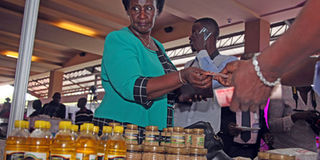Ministry moves to protect women in policy review

Support. Trade minister Amelia Kyambaddye buys butter during the East African Trade Development Forum in Kampala recently. PHOTO BY STEPHEN WANDERA
What you need to know:
- A total of 4,776 Ugandan women have benefited from the programme since 2015, out of 25,000 women across East Africa.
- Mr Matsaert said they have also increased market access through establishment of five cooperatives in sub-sector areas of beans, coffee, maize, handcrafts and beverages in Hoima, Kabale, Mpigi, Jinja, Masaka and Kapchorwa districts.
The ministry of Trade has started reviewing all trade policies with the aim of incorporating a gender provision with the sole purpose of addressing challenges faced by women as they transact business, especially exports.
“Moving forward, as government, through a collaborative effort, we aim to reduce challenges that women face as traders and call upon other organisations to join us,” said Ms Amelia Kyambadde, the Trade minister, said during a trade and development forum in Kampala recently.
The forum
The forum was showcasing contributions made by TradeMark East Africa (TMEA), a non-profit organisation, towards promoting women in trade under the hashtag, #LetWomenTrade.
A total of 4,776 Ugandan women have benefited from the programme since 2015, out of 25,000 women across East Africa.
Ms Kyambadde added: “This programme demonstrates that public private partnerships can actually bear tangible results when fully utilised. As government, we will continue supporting partners to strengthen women and trade programmes in the country.”
To increase numbers
TMEA chief executive officer Frank Matsaert said: “In the next five years of our strategy, we will scale up our programme and reach more than 300,000 women across East Africa.”
Mr Matsaert said they have also increased market access through establishment of five cooperatives in sub-sector areas of beans, coffee, maize, handcrafts and beverages in Hoima, Kabale, Mpigi, Jinja, Masaka and Kapchorwa districts.
Ms Clare Kabakyenga, one of the beneficiaries, detailed how the organisation helped her to penetrate regional markets.
“I started trading to increase my income. My journey began in farming, first planting potatoes and then beans, which are viewed as women crops in my culture,” said Ms Kabakyenga, who is a member of Manyakabi Area Cooperative Enterprises Ltd, which exports maize and beans. She added: “Farmers in my district are mostly small scale and yet to penetrate markets competitively, you need volumes.”
Ms Kabakyenga’s cooperative enterprise has 8,105 farmers, 89 per cent of which are women. They do supply maize and beans in bulk for export.
“Our first export spent eight days at the border because we had to get a certificate of origin (CoO) and a Phyto-sanitary certificate,” she shared.
Ms Kabakyenga said being new in export business, they had a tough time understanding the documents resulting in a lot of back and forth movements with border officials. The first trip was a loss. Things became easier in 2015, when they learnt about TMEA training programme on supporting trade at the borders.
Before the programme and training Kabakyenga used to make Shs800, 000 ($224) per season from selling maize, now she makes Shs70million ($19,600) per season.
At cooperative level, they would make Shs9m ($2,520) per season, currently they make Shs603 million ($168,840) from maize and Shs152m ($42,560) from beans.
The cooperative turnover in the last edited accounts was Shs2 billion ($560,000).
TMEA plans
Increase numbers. TradeMark East Africa (TMEA) plans to scale up the Women and Trade programme to reach more than 300,000 women across East Africa. The Women and Trade programme reaches more than 25,000 women, 4,776 of whom are in Uganda.




